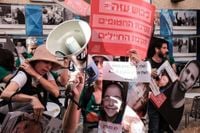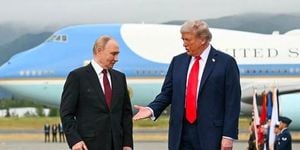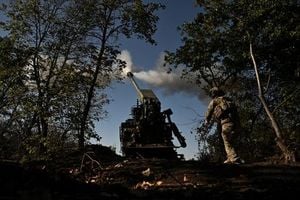On September 17, 2025, the streets outside Prime Minister Benjamin Netanyahu’s Jerusalem residence were once again the epicenter of anguish and anger, as families of Israeli hostages held in Gaza staged a determined protest. Their message was unmistakable: they would not leave until the government took decisive action to secure the return of the remaining hostages—a painful demand that has come to symbolize the ongoing trauma of the Gaza conflict.
"We are here and we won't move from here," declared Ofir Braslavski, father of Rom Braslavski, who not only holds Israeli citizenship but is also a German national. According to Deutsche Welle, Braslavski recounted how Netanyahu had personally promised him a month and a half earlier that he "would bring back the boy." Instead, Braslavski accused the Prime Minister of doing "everything not to bring him back," laying blame squarely at Netanyahu’s feet: "The blood is on your hands." The pain is compounded by the memory of distressing videos released at the end of July, showing Rom and another hostage severely emaciated—a stark reminder of the hostages’ dire circumstances.
Braslavski was not alone in his condemnation. Anat Angrest, mother of hostage Matan Angrest, publicly accused Netanyahu of sacrificing the lives of the hostages with the newly launched ground offensive in Gaza City. Addressing not only government officials but also the soldiers and their families, she warned, "If they too were to be kidnapped by the Palestinian militant organization Hamas, this government will not bring them back." As Haaretz reported, the Hostages and Missing Families Forum echoed these sentiments, stating, "We will not stop and we will not give up on our 48 brothers and sisters!" The group called on Israelis to join them in Jerusalem and demand an immediate agreement to secure the hostages’ release and end the war.
The Gaza war, which began on October 7, 2023, when Hamas and other Islamist groups attacked Israel—killing around 1,200 people and abducting more than 250 to Gaza—has left deep scars on both sides. As of September 17, 2025, 48 hostages remain in Gaza, with Israeli authorities believing only 20 are still alive. The conflict has exacted a staggering toll: according to the Hamas-run Health Ministry, more than 65,000 Palestinians have been killed, including numerous women and children, and over 164,000 wounded out of a population of 2.2 million. An Israeli military database cited by Haaretz suggests that 83 percent of those killed were civilians.
The violence has not abated. On the same day as the protest, Gaza medical officials reported 62 Palestinians killed in Israeli Defense Forces (IDF) attacks, with a particularly harrowing incident in which 13 people were killed while leaving Al-Shifa Hospital in Gaza City. The IDF also launched a new ground offensive in Gaza City, intensifying fears for the remaining hostages and the civilian population alike.
The frustration and grief of the hostages’ families spilled over into pointed accusations. Michel Illouz, father of Guy Illouz, who was killed on October 7 and whose body was taken to Gaza, addressed Netanyahu and his wife: "Do you care that my child is rotting there in Gaza? What's important for you is appropriating more roads, more government, more power and more power for yourselves." He called on Sarah Netanyahu directly: "Come explain to us how you sleep at night when I haven't been able to sleep for two years. We are here to stay." Yachi, father of released hostage Arbel Yehoud and murdered Dolev Yehoud, was equally direct: "You're the one who decides to keep them captive. Ariel and David [Cunio] and the rest of the hostages. Don't hide behind the duo of Smotrich and Strook. Everything is in your hands. You're to blame for them still being there, you are the only one putting them in danger of death at the hands of the terrorists and from military action. You're the one who will have the blood of soldiers who die in the war on his hands."
The protests in Jerusalem were not isolated. About 200 demonstrators, including many relatives of the hostages, gathered to demand action. The emotional toll was palpable, with tents pitched in front of the Prime Minister’s residence as families vowed to remain until their loved ones were brought home.
The conflict’s repercussions have reverberated far beyond the region. On the international stage, British Prime Minister Keir Starmer announced plans to recognize a Palestinian state after U.S. President Donald Trump’s visit, a move postponed to avoid overshadowing a joint press conference. Starmer had previously stated that Britain would recognize a Palestinian state before the UN General Assembly if Israel did not take significant steps to improve conditions in Gaza, including agreeing to a ceasefire and allowing humanitarian aid to resume. The U.K. ambassador stressed that the recognition was "not intended as a threat."
In the United States, Senator Bernie Sanders became the first U.S. senator to describe Israel’s actions in Gaza as "genocide," citing the high civilian death toll and referencing statements by Israeli officials as evidence of intent. Sanders wrote, "The truth is, whether you call it genocide or ethnic cleansing or mass atrocities or war crimes, the path forward is clear. We, as Americans, must end our complicity in the slaughter of the Palestinian people." His remarks followed a conclusion by a United Nations commission that Israel’s actions meet the criteria set forth in the Genocide Convention. The White House did not immediately respond to Sanders’ criticism.
Meanwhile, internal tensions simmered within Israeli society. Two IDF soldiers were lightly wounded by tear gas during a protest in Kfar Yona after the arrest of draft dodgers, highlighting divisions over military service and the ongoing conflict. The IDF stated, "As part of the IDF's ongoing enforcement operations, several draft dodgers were arrested on Wednesday, court-martialed and sentenced to military prison. The arrestees were transported in a military vehicle to a military prison. A short time ago the vehicle encountered a demonstration at the Kfar Yona intersection. Several demonstrators threw stones and sprayed tear gas at the vehicle. One of the arrestees managed to escape."
Elsewhere, Syria’s President Ahmed al-Sharaa signaled possible progress in negotiations with Israel for a security pact, stating that results could come "in the coming days." He emphasized that any agreement must respect Syria’s airspace and territorial unity, with United Nations oversight, and stressed that there was no pressure from Washington to reach a deal.
Amidst the violence, there were small glimmers of hope. The U.K. government announced the evacuation of a group of critically ill and injured children from Gaza for urgent medical treatment, accompanied by their immediate families. The World Health Organization supported the transfer of 10 "critical" children and 50 companions, describing the operation as "complex" and humanitarian in nature. More children are expected to arrive in the U.K. in the coming weeks, according to the Department of Health and Social Care.
As the conflict grinds on, the voices of the hostages’ families grow ever louder, refusing to let their loved ones become mere statistics in a war that has already claimed too many lives. Their protests in Jerusalem serve as a stark reminder that, for many, the wounds of this conflict remain painfully open—and the search for answers, justice, and peace continues.




